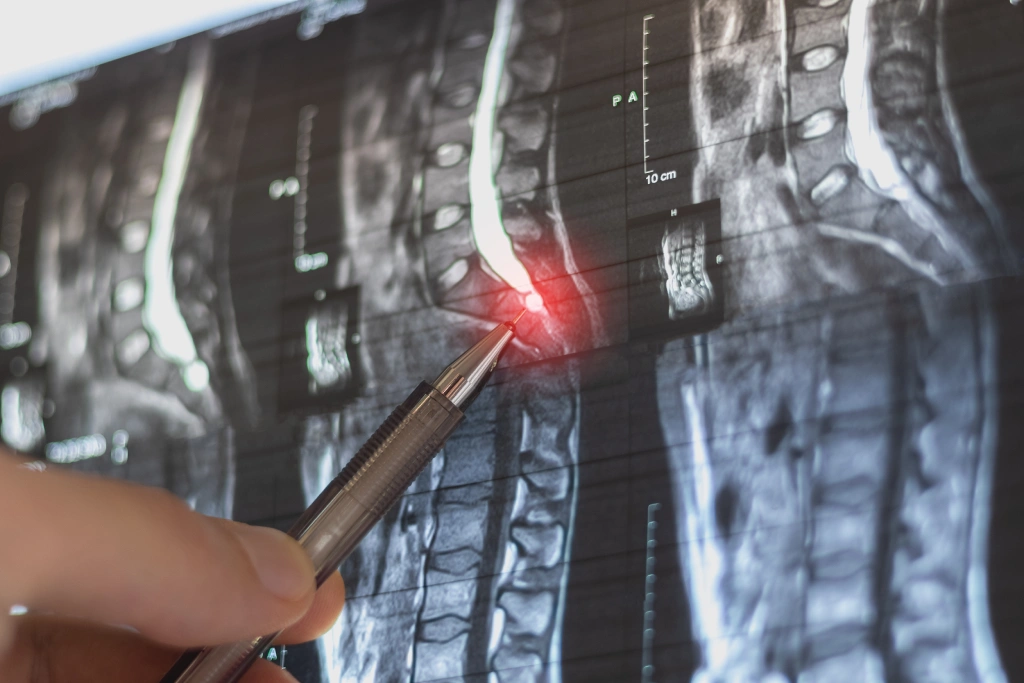June 5, 2025 | personal injury Claims
Brain Injuries from Motor Vehicle Accidents in Alberta
Table of Contents
Motor vehicle accidents (MVAs) are one of the leading causes of mild traumatic brain injuries (MTBIs) and traumatic brain injuries (TBIs) in Alberta. While many collisions result in minor injuries, others cause life-altering damage, which may be caused by head injuries. Brain injuries can affect all elements of a person’s life including their ability to work, assist with household chores, and enjoy recreational activities. Unlike visible physical injuries, brain injuries are rarely visible. The symptoms can be complex including symptoms that impact your vision, hearing, balance, memory, cognition, and emotional regulation.
When a brain injury occurs in a motor vehicle accident, mentioning your symptoms early on is key to securing proper medical care and legal support. Medically it is important that you are thorough with your medical team, so you get the right treatment and the right specialists to assist in diagnosing and treating your injuries early on. Medically there are treatment for head injuries like vestibular physiotherapy. Legally, defence counsel will challenge whether you sustained a head injury in the accident if you fail to mention that you lost awareness or lost consciousness in the accident.
This article explores how car accidents may cause brain injuries, strategies or reducing risks on Alberta roads, and financial coverage available to those who have suffered auto-related brain trauma.
Brain Injuries Caused by Car Accidents
Brain injuries from motor vehicle accidents can vary in severity, depending on the force of impact, the location of the injury, and whether the victim sustained secondary trauma. Some injuries are obvious right away, while others may take days or weeks to show up.
MTBIs may occur without any physical contact to the head. Abrupt acceleration or deceleration of the head can cause the brain to impact the inside of the skull. Motor vehicles’ occupants frequently have their heads “whipped” (as in whiplash) forward or backwards if the vehicles violently collide in an accident. We explore various types of brain injuries below.
Concussions
Concussions are MTBIs that occur when the brain experiences sudden movement within the skull due to impact. Symptoms can include dizziness, headaches, nausea, confusion, and temporary memory loss. While concussions are often considered less severe than other TBIs, repeated head injuries can lead to long term complications.
Contusions (Brain Bruising)
A contusion refers to bruising of the brain caused by a direct blow to the head. In car accidents, this could occur when a person’s head strikes the steering wheel, dashboard, or window. Large contusions may require surgical intervention if they lead to swelling or bleeding.
Diffuse Axonal Injuries (DAI)
A diffuse axonal injury (DAI) occurs when the brain rapidly shifts inside the skull during violent movement, causing extensive damage to brain cells. DAIs are often seen in high-speed collisions and can lead to unconsciousness or even coma. Many cases result in severe, long-term cognitive and physical impairments.
Coup-Contrecoup Injuries
These injuries occur when the brain is impacted on one side of the skull and rebounds to the opposite side, causing damage at both points of impact. Common in rollovers and high-impact crashes, coup-contrecoup injuries can lead to long-term motor function loss and speech difficulties.
Hematomas (Blood Clots)
A hematoma forms when blood accumulates between the brain and skull, often due to trauma. If left untreated, hematomas can increase pressure on the brain, resulting in life-threatening complications.
Brain injuries affect victims in multiple ways: physically, cognitively, and emotionally. Depending on the severity, they can require extensive rehabilitation, therapy, and long-term care, making financial and legal support critical for recovery. Drivers, passengers, cyclists, skateboarders, pedestrians, and other road users are at risk of sustaining an MTBI or a TBI in a vehicle collision.
Improving Safety on the Road
While brain injuries from car accidents can have devastating consequences, taking proactive measures to improve road safety can significantly reduce the risk of such injuries. In Alberta, as elsewhere, some ways to prevent crashes and protect vehicle occupants are:
- Wearing seatbelts properly: Seatbelts are one of the most effective ways to minimize the force of impact in a collision. Ensuring proper usage—keeping the lap belt low across the hips and the shoulder belt tight across the chest—reduces the risk of serious head trauma.
- Avoiding distracted and impaired driving: Using a mobile phone, adjusting temperature or GPS controls, or eating while driving can lead to momentary distractions that increase the risk of accidents. Driving under the influence of alcohol or drugs also significantly impairs reaction times and decision-making abilities.
- Obeying speed limits: Excessive speed increases the severity of crashes. Following posted speed limits and adjusting driving habits based on road conditions, such as snow and ice or poor visibility, can help reduce the chances of suffering a brain injury.
- Using advanced vehicle safety features: Many modern vehicles come equipped with technology such as automatic braking, lane departure warnings, and collision detection systems. These features help prevent accidents by alerting drivers to hazards in real time.
- Wearing helmets for motorcyclists and cyclists: Alberta law mandates helmet use for motorcycle riders and cyclists under the age of 18. Although it is not legally required, wearing protective headgear is highly recommended for adult cyclists as well. Helmets significantly lower the risk of TBIs in the event of an accident.
No safety features can eliminate the risk of accidents. However, adopting responsible driving behaviours and using protective equipment can significantly reduce the likelihood of sustaining a serious brain injury.
Compensation for Auto-Related Brain Injuries in Alberta
Most Alberta residents who suffer a brain injury in a car accident will need to rely on compensation for covering medical expenses, lost wages, and long-term care. Several avenues exist for victims to pursue compensation.
Under Alberta’s auto insurance system, Section B benefits provide coverage for medical expenses and rehabilitation costs following an accident. Regardless of fault, injured drivers and passengers may receive up to $50,000 (over a 2-year period) in medical benefits for treatments, including physiotherapy, cognitive rehabilitation, and psychological counselling.
When a brain injury results from another driver’s negligence (for example, reckless driving, speeding, or impaired driving), The victim can file a personal injury lawsuit to recover damages. Compensation may include (but is not limited to) medical expenses beyond Section B limits, loss of income and future earning potential, pain and suffering.
If a TBI results in permanent disability, the victim may qualify for a significant settlement or trial award. These claims assess the injuries’ lifelong impact and often involve higher settlement amounts.
In cases where a car accident leads to a fatal brain injury, surviving family members may pursue a wrongful death claim against the at-fault driver or the driver’s insurance company. Compensation could include funeral expenses, loss of financial support, and damages for emotional distress. Other death benefits are available through Section B.
Seek Legal Advice If Your Brain Was Injured in an MVA
Researching all your potential sources of financial support, let alone pursuing them, can be very daunting, especially if you do not have a legal background. Our Calgary car accident lawyers are available to help.
Brain injuries from car accidents can be life-altering, requiring extensive medical care and financial resources for recovery. If you or a loved one has suffered a brain injury due to an auto accident in Alberta, seeking legal advice can be instrumental in securing fair compensation and holding negligent parties accountable.
Call Us to Discuss Your TBI and Support Options
Our Alberta personal injury lawyers have supported numerous clients with TBIs and advanced their claim to a successful outcome. If you or a loved one suffered a brain injury because of an MVA, we encourage you to discuss your circumstances with our team of experienced Alberta personal injury lawyers.
We can provide you with specific legal guidance at a free initial consultation. We work on contingency only, so you will only have to pay us if we win. Please call us on our 24-hour toll-free line at 1-888-494-7191 to schedule an appointment.
Written by Joseph Fearon
Personal Injury Lawyer
Lawyer Joseph Fearon’s practice focuses on personal injury claims, including brain injury claims, complex motor vehicle accident claims, and claims with challenging liability scenarios.
More personal injury Topics
Here’s more information on personal injury related topics that we think you might find helpful.

personal injury
|
September 3, 2025
Understanding Spinal Cord Injuries
Spinal cord injuries can be life-altering. Because the spinal cord carries signals between the brain and the rest of the body, damage to it often…

personal injury
|
September 3, 2025
What Is Post-Concussion Syndrome?
Most people think of a concussion as a temporary injury. With rest and proper care, symptoms often improve within a few weeks. But for some,…

personal injury
|
June 5, 2025
Catastrophic Injuries in Alberta
Catastrophic injuries are very serious injuries that impose lasting consequences. For legal purposes, catastrophic injuries are defined in Alberta as permanently damaging to the victim’s…
Speak With Our
Legal Team for FREE
Find Out if You Have a Case in Under 5 Minutes
Speak to a Lawyer Now!
We’re here to help.
